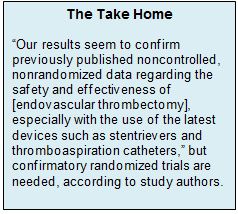Key Points:
- Study evaluates outcomes of endovascular thrombectomy for basilar artery occlusion
- Good rates of recanalization, outcomes, and mortality seen
A new case series adds to mounting evidence that basilar artery occlusion can be safely and effectively treated with endovascular thrombectomy. The study was published online June 3, 2016, ahead of print in the Journal of Neurosurgery.
Frédéric Clarençon, MD, of Pitié-Salpêtrière Hospital (Paris, France), and colleagues reviewed details on 34 consecutive patients who were treated at his institution for acute basilar artery occlusion using an endovascular approach.
Basilar artery occlusion is a rare (1%) but severe subtype of stroke associated with spontaneous mortality rates as high as 80% to 90%, they report. While endovascular management of acute ischemic stroke is widely accepted, its benefits for this particular subtype of stroke remain unclear.
In their analysis, half of patients experienced successful recanalization (defined as a TICI 2b-3). By 3 months, 32.5% had good clinical outcome (defined as mRS 0-2) at 3 months and the mortality rate was 29.4%.
New Devices an Improvement
Patients treated with the Solitaire stent retriever and the ADAPT catheter had a higher recanalization rate, with 12 of 13 patients (92.3%) achieving a TICI 2b-3, compared with 5 of the 21 patients (23.8%) treated with older devices (P = .0002). The new devices were also associated with a shorter procedure duration (88 ± 31 minutes vs 126 ± 58 minutes, P = 0.04).
To add weight to these findings, write the authors, “Systematic reviews of the literature focused on endovascular treatment results in [basilar artery occlusion] with and without new devices such as stent retrievers also seem to show higher rates of successful recanalization and good clinical outcome with last-generation devices.”
The findings of this series are reassuring, the authors say, writing, “Our results seem to confirm previously published noncontrolled, nonrandomized data regarding the safety and effectiveness of [endovascular thrombectomy], especially with the use of the latest devices such as stentrievers and thromboaspiration catheters.”
They emphasize, however, that these results must be confirmed with randomized controlled trials.
Source:
- Fahed R, Di Maria F, Rosso C, et al. A leap forward in the endovascular management of acute basilar artery occlusion since the appearance of stent retrievers: A single-center comparative study. J Neurosurg. 2016;Epub ahead of print.
Disclosures:
- Dr. Clarençon reports no relevant conflicts of interest.


